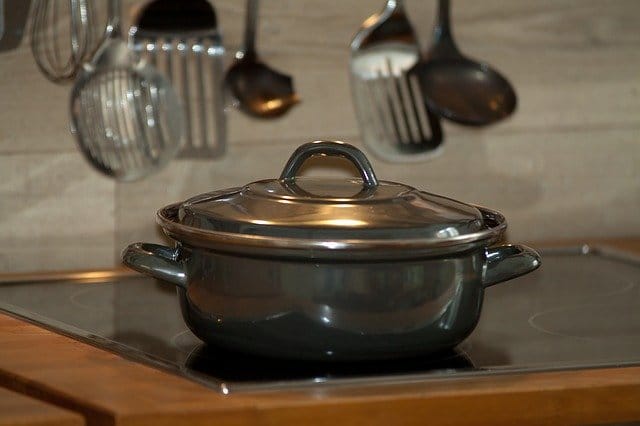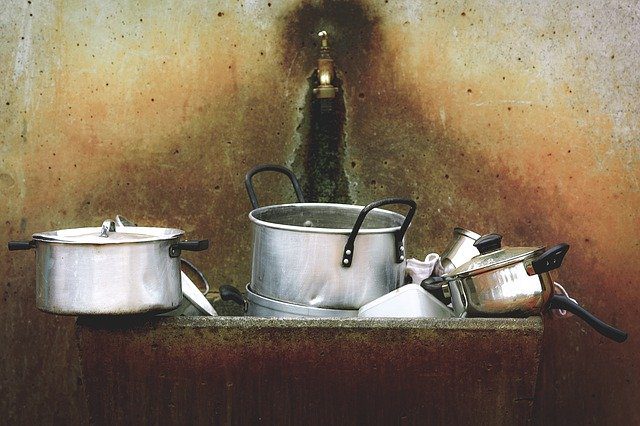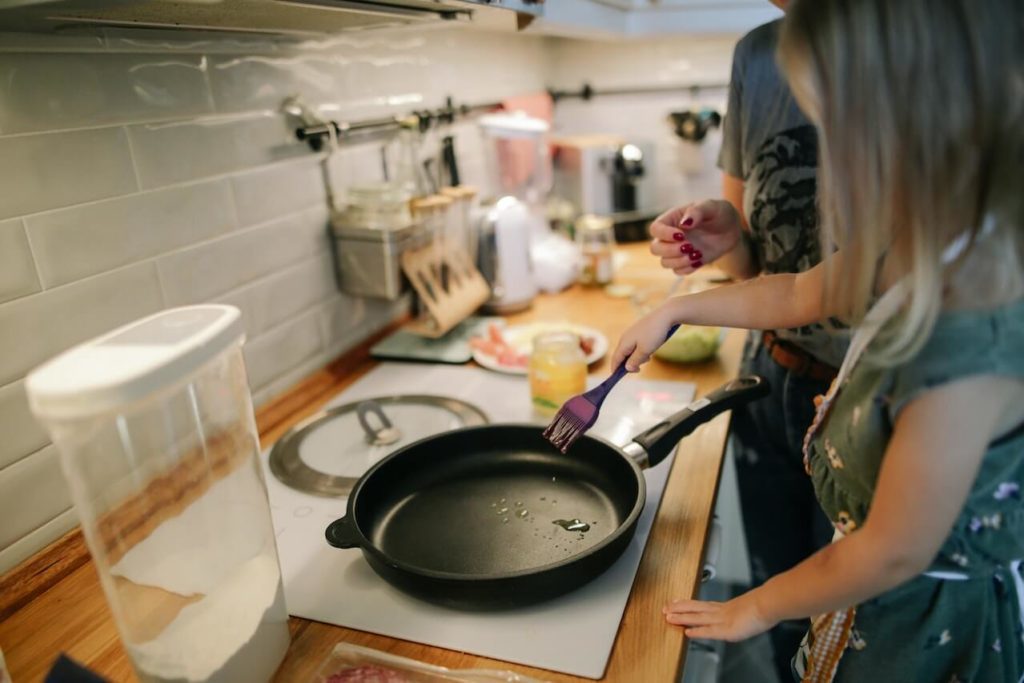The market is flooded with a massive variety of pots and pans made with different materials. It can become difficult to compare the durability, aesthetics, budget, and maintenance of various pots and pans. We all want to buy the best that is also a healthy option to cook in. It is important to gain knowledge about materials that are safe to use for cooking, their durability and cost effectiveness. Most commonly used material for making utensils is aluminum because it is light weight and is cheap in comparison to the other materials.
However, there is a common problem with aluminum utensils. Aluminum leaches into the food that can cause numerous side-effects. The important question is that is hard anodized cookware safe? If yes, what makes this cookware safe? Hard-anodized aluminum has some electro chemical process that makes it safe to use. It is also an undeniable fact that hard anodized cookware has innumerable advantages. Let’s find out more about hard anodized cookware –
Table of Contents
Understanding the Basics of Hard-Anodized Cookware
Hard-anodized cookware is primarily constructed of aluminum, a lightweight metal with excellent heat distribution qualities. The anodization process is what distinguishes hard-anodized cookware. Aluminum is immersed in an acid bath and subjected to an electric current during anodization, resulting in the creation of a hard, oxide coating on the surface.
This coating improves the cookware’s corrosion and scratch resistance.
The Safety of Aluminum
One major problem with aluminum cookware is the possibility of metal leaching into food during cooking. Aluminum is typically regarded as safe at low quantities, and the anodization process reduces the risk of leaching greatly. The hard oxide layer formed during anodization functions as a barrier, keeping the aluminum out of direct contact with the food being prepared.
According to research, the amount of aluminum leached from hard-anodized cookware is negligible, particularly when compared to uncoated aluminum cookware. The Food and Drug Administration (FDA) has concluded that using aluminum cookware is safe, and the anodization process offers an added layer of assurance.
Scratch Resistance and Durability
The durability of hard-anodized cookware is one of its most notable characteristics. The strong oxide layer not only prevents corrosion but also makes the cookware scratch resistant. This endurance ensures that the surface remains intact over time, decreasing the possibility of particles entering your food.
However, while hard-anodized cookware is generally scratch-resistant, using metal utensils or abrasive cleaning products might damage the surface. Following the care instructions provided by the manufacturer is critical to preserving the cookware’s integrity and guaranteeing its long-term safety.
The Advantage of Nonstick
Many hard-anodized cookware sets include a nonstick coating, which adds another level of convenience to the cooking experience. This coating, which is frequently comprised of materials such as polytetrafluoroethylene (PTFE) or ceramic, lowers the need for additional oil or butter, making it an enticing choice for people looking to cook with less fat.
Nonstick surfaces also make cleaning easier because food is less likely to stick to the pan. However, concerns have been raised about the high-temperature safety of PTFE-based nonstick coatings. When heated, PTFE can emit hazardous vapors. It is critical to utilize nonstick cookware within the temperature range indicated and to prevent exposing it to extremely high heat, especially without food.
Related Read : Top 4 Hard Anodized Tawa Reviews: Pick the Best One For Your Kitchen.

Is Hard Anodized Cookware Reactive?
Hard-anodized cookware is commended for being non-reactive, which means it does not react with acidic or alkaline foods while cooking. This non-reactivity is critical for keeping the components’ inherent tastes. Hard-anodized cookware, unlike some reactive materials such as cast iron or uncoated aluminum, will not impart metallic flavors or discoloration to your culinary creations.
Pros of Anodized Aluminum Cookware
As everything comes with some benefits, it comes with pros too. Here is the list of advantages of anodized aluminum cookware. It also clears the doubt about is hard anodized cookware safe.
- It is one of the best heat conductors as well as spreads equally heat. Due to its food will be evenly cooked.
- It is twice to thrice time stronger than the stainless steel. Therefore, it is one of the most durable cookware.
- The coating of hard anodized cookware is not like the peel-off coating. It cannot be peel off like others.
- It has a non-stick coating. It works as a barrier to prevent food from sticking.
- It is easy to use, handle as well as lightweight. These teenagers do not face any trouble while cooking. Even the person who is suffering from arthritis can cook the food on it.
- Hard anodized cookware has longer life as compared to other non-stick. Therefore, it is a one-time investment.
- There is numerous hard anodized cookware that does not use PFOA. So you can say that those are non-toxic.
- If you can compare the price of cookware, then you will find hard anodized cookware is cheaper.
- As it is non-reactive to food, that means it is easy to clean. You do not need to struggle about cleaning.
- It is safer than an oven or any kitchen equipment.

The advantages, as mentioned above, reveal the answer to the question is hard anodized cookware safe. Therefore, it is better to spend the prestigious money on the right product. In addition to it, you can easily buy this type of cookware, either online or offline.
Cons of Anodized Aluminum Cookware
If the hard-anodized aluminum has some pros, it also has some disadvantages. Here is the list of cons of anodized aluminum.
- You cannot cook the food on it with a high flame.
- It requires high maintenance. If you want it to have a longer lifespan, then maintain it accurately as well as carefully.
- This type of hard anodized cookware does not go well with induction. So it is not the safe induction cookware.
- Plain aluminum can leach into food and cause numerous health side effects.
- You cannot clean the hard-anodized cookware with a dishwasher. It may damage the surface of the nonstick.
- You cannot use any cooking spray over it. This is not safe.
- Chemical costing on the cookware is a little bit heavy.
Is Aluminum Cookware Safe For Cooking Food?
Plain aluminum utensils can leach into the food which is not good for health. Numerous food materials are categorized as acidic food. These include sauces such as tomato sauce, tart sauces and many more. If you cook acidic food on it, then it will rapidly leach into your food. In addition to it, if you store the cooked food in it, then it will also be harmful.
As aluminum is not absorbent, even if the hard-Anodized pan has some scratches, leaching will be in negligent amount. Hence it is safe for food and does not deteriorate the quality of food. You can cook the food on it.
How To Avoid Scratches On Hard Anodized Cookware?
If the surface is damaged, then it causes numerous health risks. Otherwise, it does not cause any side effects on health. You should have to avoid this factor. Here is the list of ways by which you can deal with these two problems.
- For the long-lasting coating, it is recommended to wash this cookware by your hand. Do not use any dishwasher on it.
- Do not use any abrasive cleaner. It can cause scratches or affect the coating.
- You can use only mild soap on it. This will avoid the problem of discoloration and prevent the coating from damage.
- Keep the hard anodized cookware in a safe place. You can also hang it in the kitchen.
- Prefer wooden utensils/ladle while cooking the food. It will not damage the coating of hard-anodized cookware. In addition to it, avoid storing food in it.
- Cook the food on low flame. If you cook the food on high flame, then it causes damage.
- If you preheat the pan, then the fumes will release. Therefore, avoid it.
Apply all the ways, as mentioned above, on your hard anodized cookware. These will surely protect the coating from damage.
Maintaining Safety
While hard-anodized cookware is typically safe, it must be cared for and used properly to remain so. Here are some important tips for maintaining the safety of your hard-anodized cookware:
- Follow the manufacturer’s directions for use.
- Avoid Using High Heat Without Food.
- Use gentle cleaning methods.
- Examine Nonstick Coatings.
- Keep an eye out for scratches.
How To Buy Hard Anodized Cookware?
- Keep quality in mind before making a purchase. Look for reliable brands that have been in the market for longer period of time.
- When you are purchasing, then think about your usual cooking method. For instance, what kind of food you usually cook. In addition to it, when will you use the hard anodized cookware? Always look for that cookware set that will fulfill all your demands and needs.
- Hard anodized pans are in numerous ranges with the nonstick quality. The non-stick quality includes the coating of Teflon. Teflon coating can protect your food from leaching.
- Decide on a budget.
Also Read : Find the Best Stainless Steel Cookware In India.
Frequently Asked Questions
Here are some interesting FAQs on Hard Anodized Cookware :
1. Is hard anodized cookware safe for health?
Hard anodized cookware is safe to use as these are made of high grade anodized aluminum that makes it ideal for cooking
2. Does hard anodized cookware have PFOA?
Most of the hard anodized cookware do not make use of PFOA. Make sure to read the features of the product carefully before buying one.
3. Which is safer: hard anodized or nonstick?
Non-stick pans and hard anodized cookware offer most of the same benefits. However, in terms of the durability it is scratch resistant and long-lasting.
4. What's the safest cookware to use?
Some of the safest cookware to use are stainless steel, ceramic, and glass.
Conclusion
In conclusion, when used properly, hard-anodized cookware is generally deemed safe for cooking. The anodization process creates a protective barrier against aluminum leaching into food, and the cookware’s non-reactive nature assures that it does not alter the taste or color of your dishes.
However, like with any other piece of cookware, preserving safety necessitates responsible use and good upkeep. Following the manufacturer’s directions, avoiding excessive temperatures, and keeping an eye on the quality of nonstick coatings are all important practices for maintaining the safety and functionality of your hard-anodized cookware. Hard-anodized cookware may be a dependable and long-lasting addition to your kitchen, giving a great platform for cooking delicious and safe meals.


